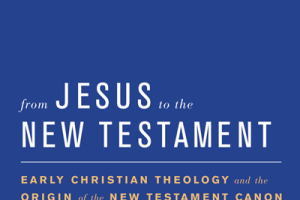Last week I talked about advertising and evangelism. As a related issue, I also want to discuss the way in which Christians do Apologetics. How far can Apologetics take us? Do we assume that someone can be argued into the Kingdom? Is the goal of Apologetics merely to convince? Is being convinced the same as exercising faith? These are some of my general questions about the efficacy of Apologetics as a whole.
Personally, I chose to study Biblical Studies & Theology instead of Apologetics because I felt that prior to defending the faith, I ought to know the faith. This is not intended to denigrate those with a passion for Apologetics. It’s an important arm of the Church to be sure. I’m now realizing that since I’m outside my ‘Christian college bubble’ I need to stand up and defend the faith more regularly than before. However, as I reflect on the common Apologetic arguments in my arsenal, I find them to be incredibly deficient. Allow me to explain.
1. The Cosmological Argument. This is the argument from design. A ‘bread and butter’ argument for theism. When I consider the world I’m convinced that something rational stands behind the created order. There appears to be a designer. Even if creation is corrupt (cf. Gen 3), this doesn’t nullify the basic point of intelligence. Just like the famous watchmaker analogy: a broken watch doesn’t negate the existence of the watchmaker. Similarly, as C. S. Lewis said in his book Miracles, from non-rationality we should only expect non-rationality to exist. But rational creatures exist and there is apparent order in the way the world functions. For this reason I find it ironic that naturalistic evolution is as popular as it is among scientists since there are so many specialists who spend years and years studying minutia in relation to everything there is to know about science. All of these rational minds spend decades studying the world, and then deduce that the origin of the cosmos is from something non-rational. If rational scientists spend their whole life trying to understand the world doesn’t this tell us something? How many science PhDs have been awarded? How many monographs and journal articles written? I would only suspect that this kind of attention to science could be given if something more intelligent was the cause of it. This only confirms the truthfulness of Romans 1 to me (some can stare at creation all day and still not see the creator behind it). But! And this is a huge but. This argument doesn’t provide us with a specific brand of Monotheism (whether Christian, Jewish or Muslim), nor does it give us Monotheism over against Pantheism or Polytheism. Furthermore, it doesn’t even get us to Deity necessarily, as there could be multiple explanations for cosmological origins. Now don’t get me wrong, design is convincing within my Christian worldview, but it doesn’t get me to Jesus.
2. Textual Criticism of the Bible. Without getting into all the details of Textual Criticism, I would just like to note one apologetic that I’ve heard before. The argument goes something like this, in two parts: 1) there are more manuscripts for the New Testament than any other document from antiquity, and 2) in regards to the Old Testament, manuscripts discovered with the famous Dead Sea Scrolls have been unearthed for every book except Esther, including a nearly complete Isaiah Scroll which strongly resembles our previously oldest manuscript. Therefore, God has preserved his Word. Now, again, I like that this is true! In fact, Textual Criticism helps me realize that the words of my Bible are authentic, but this argument does not prove that the Bible is authoritative.
3. Archeology. This type of argument points out that since the places mentioned in the Bible can be found today, therefore the Bible is credible in retelling history. Yes, these places really existed, but this does not demonstrate that the events recorded in the Bible actually occurred there. Just because London exists in real life doesn’t make Harry Potter any more real. Of course, I appreciate that there is a geographical correspondence (a luxury not afforded to the Book of Mormon for instance), but this evidence can only take us so far.
4. Bible Prophecy and the Use of the OT in the NT. In Josh McDowell’s Evidence That Demands A Verdict he suggests that there are way too many prophecies about Jesus’ birth and life that make it statistically improbable that all these prophecies could be fulfilled in one person, but of course, they’re all fulfilled in Jesus. The problem with this book and this type of thinking is that it is naive. I don’t have nearly enough space to interact with this issue as I’d like, but suffice it to say that most Old Testament prophecies had a near fulfillment in the life of the author making the utterance. What the New Testament authors are doing is pointing out the typological fulfillment in Jesus. Basically, the Old Testament authors had a referent for the fulfillment of prophecy in their day and they rarely saw beyond the initial fulfillment in their lifetime. Thus, the use of the Old Testament helps us understand what the New Testament authors are doing primarily. It helps us see what categories they are working with (e.g. Davidic categories, priestly categories, etc). For the sake of space I will note two examples of this. 1) When on the cross Jesus cried out, “My God, My God, why have you forsaken me?” the words clearly go back to Psalm 22. Rather than thinking that David prophesied that the Messiah would say these words, this utterance shows us that Jesus was identifying himself as a regal figure experiencing divine abandonment like David experienced in his own life. 2) While on the cross when Jesus’ bones were not broken by the soldiers John tells us this fulfilled Ex 12.46 and Num 9.12 (Jn 19.31-36). However, these verses are not about the Messiah’s death, but about the procedures for preparing the Passover Lamb. Rather than fulfilling prophecy in the one-to-one way we often imagine it, John is showing us his theological cards, so to speak. He views Jesus as the atoning sacrifice who’s significance is found in the original Passover and Exodus event. Essentially then inner-biblical prophecy has hardly any apologetic value in the way Christians normally imagine. This shouldn’t damper anyone’s spirit, however. The use of the Old Testament in the New Testament is quite exciting, but it has certainly been abused quite a bit. This is largely so because Christians don’t know their Old Testaments well enough, unlike the authors of the New Testament.
My point in all of this is that the common apologetic arguments don’t take you where you might expect them to. At the end of the day the issue is about faith. Do you believe the witness of Scripture and the Holy Spirit or not? However, there is still room for Apologetics in my mind. For me, it all boils down to the Resurrection. If Jesus was not raised from the dead then nothing else about our faith matters at all and we are people to be pitied (1 Cor 15.12-19). There are indeed great reasons to believe that the Resurrection occurred, and when confronted with this event we are placed in a moment of crisis. We can only conclude that Jesus’ message has been vindicated and that he is who he said he was. If the Resurrection took place, the whole kit and kaboodle goes with it. The Resurrection then should be our primary apologetic, for it is the most distinctly Christian of all.
To conclude, this point can be illustrated through the very ‘mission verse’ trumpeted by Christian Apologists:
“…always being prepared to make a defense to anyone who asks you for a reason for the hope that is in you” 1 Peter 3.15b
This verse is understood to mean that Christians must have good arguments to believe what they believe. Contextually though, this stretches the point being made considerably. Rather than envisioning a venue for debate, the “defense” to be given is in the context of suffering for the sake of righteousness (1 Pet 3.14). Thus the idea is, can you explain the source of your hope as you suffer?, rather than something like, have you memorized Thomas Aquinas’ Quinque viæ (the Five Ways or Proofs for God’s existence)? The source of hope, as we are soon told by Peter, is that Christ conquered death and now reigns above the cosmos with all demonic powers subjected to him (1 Pet 3.18-22). The Resurrection and its implications was the early Christian defense, and it should be ours as well.





20 Comments
Leave your reply.